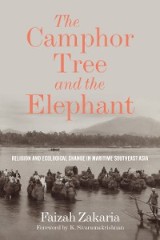Details

The Camphor Tree and the Elephant
Religion and Ecological Change in Maritime Southeast AsiaCulture, Place, and Nature
|
CHF 32.00 |
|
| Verlag: | University Of Washington Press |
| Format: | EPUB |
| Veröffentl.: | 07.02.2023 |
| ISBN/EAN: | 9780295751177 |
| Sprache: | englisch |
| Anzahl Seiten: | 280 |
DRM-geschütztes eBook, Sie benötigen z.B. Adobe Digital Editions und eine Adobe ID zum Lesen.
Beschreibungen
<p>What is the role of religion in shaping interactions and relations between the human and nonhuman in nature? Why are Muslim and Christian organizations generally not a potent force in Southeast Asian environmental movements? <i>The Camphor Tree and the Elephant</i> brings these questions into the history of ecological change in the region, centering the roles of religion and colonialism in shaping the Anthropocene—“the human epoch.” </p>
<p>Historian Faizah Zakaria traces the conversion of the Batak people in upland Sumatra and the Malay Peninsula to Islam and Christianity during the long nineteenth century. She finds that the process helped shape social structures that voided the natural world of enchantment, ushered in a cash economy, and placed the power to remake local landscapes into the hands of a distant elite. Using a wide array of sources such as family histories, prayer manuscripts, and folktales in tandem with colonial and ethnographic archives, Zakaria brings everyday religion and its far-flung implications into our understanding of the environmental history of the modern world.</p>
<p>Historian Faizah Zakaria traces the conversion of the Batak people in upland Sumatra and the Malay Peninsula to Islam and Christianity during the long nineteenth century. She finds that the process helped shape social structures that voided the natural world of enchantment, ushered in a cash economy, and placed the power to remake local landscapes into the hands of a distant elite. Using a wide array of sources such as family histories, prayer manuscripts, and folktales in tandem with colonial and ethnographic archives, Zakaria brings everyday religion and its far-flung implications into our understanding of the environmental history of the modern world.</p>
<p>Uncovers a spiritual dimension in the transition to the Anthropocene</p>
<p>Faizah Zakaria is assistant professor in the Departments of Southeast Asian Studies and Malay Studies at the National University of Singapore. She is coeditor of <i>Fatwas of Singapore: Science, Medicine and Health</i>.</p>
<p>"Absolutely fantastic. The topics covered are without a doubt the most important and pressing issues that scholars—and humanity (and the planet)—are dealing with today."—Johan Elverskog, author of <i>The Buddha’s Footprint: An Environmental History of Asia</i></p>


















